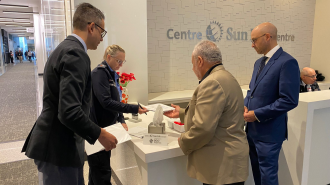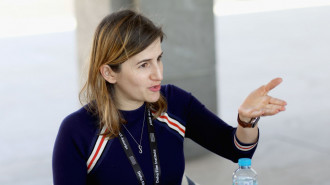
Plagued by barren harvest, farmers in northern Syria struggle to make ends meet

Farming is the main source of income for most of northern Syria, indigenous and displaced (IDPs). Crop and animal farming have always been a major part of the Syrian economy. Before the war, Syria had achieved a high level of food security and was able to provide essential produce for its population.
Syria is traditionally seen as an agricultural country and produced significant quantities of olives, citrus fruits, cotton, vegetables, and fruits prior to the outbreak of the war. Before the Arab Spring, Syria ranked second in the Arab world in olive production after Tunisia, and sixth globally in cotton production. However, agriculture has been decimated by the war and continues to face escalating challenges today.
Northern Syria traditionally enjoyed a variety of agricultural crops, including grains like wheat and barley, vegetables, and pulses. The region is also rich in olive and pistachio groves, and other fruit-bearing trees. The natural richness of the region's farmland can be attributed to the plentiful groundwater, the climate and soil quality; as well as the large labour pool.
"Before the Arab Spring, Syria ranked second in the Arab world in olive production after Tunisia, and sixth globally in cotton production"
The cultivated area in the "Euphrates Shield" region (the rural area of north and northeast Aleppo province) covers around 222,030 hectares. 70 percent of this is planted with wheat and barley, and approximately 9 percent with olive trees. The remaining land is cultivated with various types of vegetables.
In Afrin district, in the northwestern tip of Syria, the cultivated area is estimated at 92,981 hectares. Olive groves make up 90 percent of the region's crop, with a count of approximately 14 million trees. Other crops are planted in the remaining 10 percent.
Syria's economic crisis has hit the north and its agricultural sector hard, with farmers struggling to afford the high costs of essential supplies - prices in US dollars - and rocketing production costs. At the same time, they have to sell their crops in Turkish lira. The situation has effectively forced many farmers to sell their products at a loss.
|
|
44-year-old farmer Ayman Al-Mousa (44) had to leave his farmland in southern Idlib province when the Syrian government seized control of the area. Since then, he has been unable to restart his work as a farmer.
He told The New Arab that he tried to lease agricultural land near Sarmada city in northern Idlib, as farming is the only profession he's ever known.
However, he has faced huge challenges, from the high cost of leasing the land, to difficulties due to drought, and in obtaining fertilisers and seeds.
"I found myself trapped with mounting losses, especially when Turkish products were competing with local ones, which are more costly. Additionally, the high price of electricity and frequent outages pose challenges. I have to pay high prices to operate the submersible well pumps. One kilowatt-hour of Turkish electricity is sold for five and a quarter Turkish lira, which is a lot for a farming project that needs a lot of irrigation and monthly electricity," explains Ayman, who has been forced to abandon his farming aspirations for now due to these difficulties.
"Farmers are facing a shortage of essential supplies, including seeds, fertilisers, fuel, irrigation systems, animal feed, and veterinary medicines"
On the other hand, 41-year-old farmer Omar Al-Fatrawi has sought to maintain his agricultural projects by focusing on rain-fed agriculture and grain cultivation.
He temporarily stopped after being displaced from his home, when the region was being heavily shelled. However, after the signing of the "de-escalation zones" agreement in 2017, he has managed to return to his profession. This agreement brought a level of security and stability – to an extent - which has helped revitalise some agricultural areas.
Fatrawi said that he didn't have to pay for water or electricity, he just needed to purchase seeds and provide the manual labour to cultivate the land. This year his efforts have succeeded and he has managed to provide for his family.
Hail Kalash is the agriculture minister in the Syrian Interim Government (SIG). He explained that the agricultural sector has been severely affected since the war due to several factors, the most important being the continuous bombing campaigns by the Assad regime and Russia.
This has led to the displacement of many people who have left their lands, farms, and livestock, leaving large agricultural areas abandoned to lie fallow. In addition, the irrigation infrastructure, food processing plants, storage facilities, agricultural equipment, and agricultural buildings have suffered severe damage.
Kalash added that farmers are facing a shortage of essential supplies, including seeds, fertilisers, fuel, irrigation systems, animal feed, and veterinary medicines. The rising prices have made it difficult for them to obtain these.
The agricultural sector has also suffered from climate change, drought, and reduced rainfall in recent years, with irregular rainfall at critical stages of the growing season, especially for wheat crops. Additionally, frost has had a significant impact on northern Syria, particularly affecting potato fields and vegetable cultivation.
Kalash stressed that other challenges farmers face include inflation, unexpected price fluctuations, exchange rate volatility, and a decrease in agricultural advisory services.
"I can't recover the expenses I've incurred throughout the years with poor returns and diminishing yields year after year, while there is no significant support for landowners to uplift agricultural projects in the region"
Hail Kalash also points out the destruction of the infrastructure and the deliberate bombing of crops during the harvest season, as well as the lack of markets to sell farmers' crops and the rise in transport costs due to the hike in fuel costs. There is also a lack of food processing facilities and agricultural storage spaces which can regulate the entry of these products into markets.
There are also no safeguards when it comes to prices for producers, and "origin certificates" from areas in the non-regime-held areas of northern Syria are not recognised, which means efforts to export surplus produce abroad are hampered.
Certain crops, once considered economically viable like cotton and sugar beet, have disappeared from Syrian fields due to the inability of producers to reach external markets, as well as a lack of processing machines.
The SIG has made efforts to regenerate the agricultural sector. For example, it is working on gaining recognition of the origin certificate for agricultural products. It is also trying to secure funds to support the production of strategic crops such as wheat, olives, pistachios, cotton, sugar beets, and vegetables as well as to invest in cotton gins, sugar production plants, dairy and cheese factories and to support livestock projects.
The agricultural minister of the Syrian Interim Government is optimistic that the agricultural sector can be revived as the natural resources of northern Syria have withstood such pressures before. However, in both Idlib and Aleppo provinces, farmland close to the frontlines has been targeted. During harvest season, 100 hectares of farmland planted with wheat and barley burned before they were harvested after Assad's forces shelled the area. Similar events have unfolded in the Al Ghab plain.
Farmer Bassam Hassani is contemplating selling his farmland which has become a source of spiralling losses: "It pains me to sell the land I inherited from my father, but I need a profitable project, like constructing real estate and selling it," he explains, adding that recent years have been unprofitable due to inadequate farming supplies from seeds and fuel to fertilisers and pesticides.
"I can't recover the expenses I've incurred throughout the years with poor returns and diminishing yields year after year, while there is no significant support for landowners to uplift agricultural projects in the region."
"Agriculture in northern Syria is suffering from a clear and serious decline and in order to recover stability and security need to be established in the region"
Engineer Ahmed Al-Kawan is Deputy Minister of Agriculture and Irrigation in the Hay'at Tahrir Al-Sham-dominated Salvation Government, which controls Idlib. He says they are working to provide in-kind loans for wheat and oilseed crops and have distributed 2,248.65 tons of wheat seeds, 4,600 kg of cotton seeds, 718 kg of sunflower oil seeds, 2,198.2 tons of urea fertilizer, and 88,750 litres of fuel for irrigation purposes.
He also explained that a solar energy system has been installed at the Balaa irrigation station to reduce costs for local residents; this is one among several working projects to improve the water pumps and irrigation systems in Idlib and lower costs for resident farmers.
Similar to other regions, the agricultural sector in northeast Syria under the administration of the Kurdish-dominated Autonomous Administration of North and East Syria (AANES) has been facing continuous decline due to several factors that have negatively impacted most crops.
The northeastern regions of the country used to be considered the most productive for wheat, barley, and cotton production. However, in recent years, they have experienced a significant decline due to high farming costs, low rainfall, and frequent wildfires.
42-year-old farmer Ibrahim Hamoudi says he is frustrated with the pricing set by the authorities as it does not cover production costs, but farmers are compelled to sell their products to them. He called on AANES to reconsider the pricing and work on making these match the efforts and costs of farmers.
As an example highlighting the extent of the agricultural decline in Hasakah province in northeast Syria, the cotton cultivation area within the province was approximately 60,000 hectares before 2011. However, according to estimates from the agriculture departments in the province, it had shrunk to just 4,400 dunums last year.
Agricultural engineer Nabil Al-Jassem said agriculture in northern Syria is suffering from a clear and serious decline and in order to recover stability and security need to be established in the region. Its recovery is essential to prevent the loss of the basic food items which meet the minimum requirements of civilians, especially in the face of the decline of humanitarian aid into non-regime-held areas after Russia's veto.
Hadia Al Mansour is a freelance journalist from Syria who has written for Asharq Al-Awsat, Al-Monitor, SyriaUntold and Rising for Freedom Magazine
Article translated from Arabic by Rose Chacko







 Follow the Middle East's top stories in English at The New Arab on Google News
Follow the Middle East's top stories in English at The New Arab on Google News


